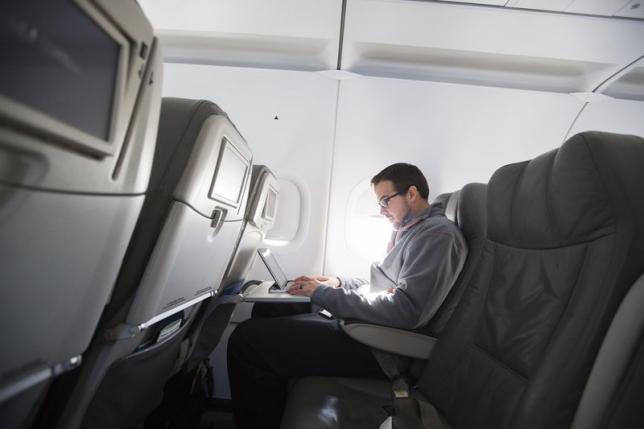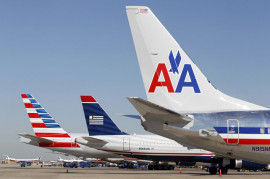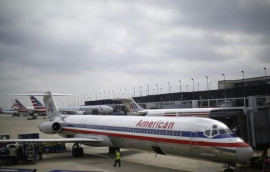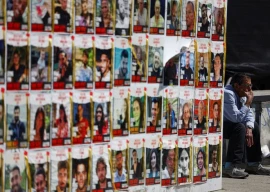
As broadband internet service becomes increasingly widespread and free in public places, it has remained, to travelers’ annoyance, stuck in the slow lane on airplanes.
But with recent developments in technology, sluggish in-flight internet speed is starting, however fitfully, to change. Still, it might not catch up to passengers’ expectations, as many are accustomed to a superior internet experience on the ground.
“Connectivity is indeed getting better on flights, but it’s a very slow process, which is frustrating to business travelers who increasingly rely on the service,” said Chris McGinnis, founder of TravelSkills, a blog that focuses on the business passenger, and an inveterate user of Wifi while airborne.
Google launches WiFi router for home use
“The thing that they must realise is that in-flight Wifi is still a very new product, and the expectation that you’ll get a good, strong signal like you do at home or office needs to be reined in,” Mr. McGinnis added. “Airlines are partially to blame for inflating expectations.”
JetBlue recently announced that more than 150 of its planes had been equipped with satellite-based Wifi, and the remainder of the fleet is scheduled for installation by next year. The airline said the broadband internet, provided in collaboration with ViaSat, a satellite broadband and wireless services company, is “similar to what customers have at home.”
What’s more, the service, same as peanuts and a soda, will be free. Deals with Amazon, The Wall Street Journal and other sponsors will help the airline pick up the tab. JetBlue currently offers a free basic plan.
This summer, Virgin America announced it was collaborating with ViaSat for its new planes and promised to deliver internet speeds “typically up to 8 to 10 times faster than any other in-flight Wifi system,” much like the experience on land.
For Virgin, the scope is limited, with 10 planes getting furnished by next June. (Gogo, the dominant service provider in the industry, will remain on Virgin’s other aircraft for the time being.) Wifi will be offered free through most of the roll-out period before a price structure is put in place.
Because JetBlue holds a 5 per cent market share in the United States and Virgin America’s share is even smaller, it is unclear what impact their strategy will have industry-wide. The four primary carriers are either committed to or exploring heightened internet speed — some by shifting to the more desirable satellite option — and are increasing the number of planes with the service as older aircraft are retired.
“Connectivity is the biggest issue on major carriers,” said Mr. McGinnis, who pointed out that more consistent service is possible for airlines with smaller fleets.
Handicapping the field, Tim Farrar, a satellite and telecommunications analyst, foresees American Airlines as most likely to advance its technologies. Mr. Farrar, president of TMF Associates in Menlo Park, California, cited American’s “ongoing fleet replacement programme that gives the opportunity for new installations.”
The oft-criticised Gogo will be part of the industry’s gradual shift to satellite. Gogo’s air-to-ground system has been the common method for fliers to connect on five United States-based airlines that represent more than 70 per cent of the market share. Gogo’s latest satellite component, called 2Ku, will go into effect this quarter; its largest commitment is from Delta Air Lines.
“There is a reason Gogo struggles performance-wise,” said Seth Miller, a travel industry analyst, noting that systems become overloaded because of bandwidth that is not infinitely available. “Gogo has probably been slower than I would like in reacting to the consumer,” he added, though he detects improvement.
Gogo expects 2Ku to increase bandwidth 20-fold and support streaming video as smoothly as it would on the ground.
SriLankan Airlines bags APEX award
Satellite may be the more effective generator of internet access, but Mr. Miller, who focuses on in-flight connectivity and contributes articles to the travel website Runway Girl Network, points out that it can take years to launch a satellite into space.
“Technology will have trouble catching up with the bandwidth issue,” he added. “It never happens fast enough for consumers. There’s always going to be a lag there.”
The average fixed broadband speed was expected to double from 2014 to 2019. But travelers who desire fast and less costly — or free — service should maybe be careful what they wish for. The fee-based format effectively caps Wifi usage on a plane, which keeps systems from becoming bogged down. Fewer customers means faster internet speed for each.
Sponsors can defray part or all of the costs, like the model JetBlue is testing, at least in the short term. Southwest, which has staked its reputation in part on free checked baggage, has not taken the same approach with free Wifi, though its current fee is a relatively low $8 per flight.
Gogo, which does not service Southwest and sets the prices on the airlines that it does service, costs $5 for one hour and $16 for an all-day pass. Customers pay an average of $13 a day. Gogo has not indicated whether fees will be affected when 2Ku is put in effect.
Mr. Farrar suggested that airlines could lean on sponsorships, but added, “there is a limit to how much money you can get.”
Without sponsors, Mr. Miller said, “I don’t think there’s any airline out there who wants to take it to a loss leader yet."
Mr. Farrar is aware that there is pressure from customers for cheaper or eliminated rates, but thinks the big four airlines will resist. “A year from now, we probably won’t see a dramatic change with the major carriers,” he said. “They are still trying to figure it out. They don’t move very quickly.”
If one big airline breaks ranks, the others might consider following, Mr. Farrar said. “In the meantime, they will try to hold on to making money if they can.”
In fact, Mr. McGinnis is skeptical that JetBlue’s plan for free service will endure.
“Putting Wifi on planes is expensive,” he said, “so I do not expect the freebies to last.”
This article originally appeared on the International New York Times.





















1713272658-0/Copenhagen-fire-(1)1713272658-0-270x192.webp)






















COMMENTS
Comments are moderated and generally will be posted if they are on-topic and not abusive.
For more information, please see our Comments FAQ